Jacopo Tagliabue
Making Databases Faster with LLM Evolutionary Sampling
Feb 11, 2026Abstract:Traditional query optimization relies on cost-based optimizers that estimate execution cost (e.g., runtime, memory, and I/O) using predefined heuristics and statistical models. Improving these heuristics requires substantial engineering effort, and even when implemented, these heuristics often cannot take into account semantic correlations in queries and schemas that could enable better physical plans. Using our DBPlanBench harness for the DataFusion engine, we expose the physical plan through a compact serialized representation and let the LLM propose localized edits that can be applied and executed. We then apply an evolutionary search over these edits to refine candidates across iterations. Our key insight is that LLMs can leverage semantic knowledge to identify and apply non-obvious optimizations, such as join orderings that minimize intermediate cardinalities. We obtain up to 4.78$\times$ speedups on some queries and we demonstrate a small-to-large workflow in which optimizations found on small databases transfer effectively to larger databases.
Building a Correct-by-Design Lakehouse. Data Contracts, Versioning, and Transactional Pipelines for Humans and Agents
Feb 02, 2026Abstract:Lakehouses are the default cloud platform for analytics and AI, but they become unsafe when untrusted actors concurrently operate on production data: upstream-downstream mismatches surface only at runtime, and multi-table pipelines can leak partial effects. Inspired by software engineering, we design Bauplan, a code-first lakehouse that aims to make (most) illegal states unrepresentable using familiar abstractions. Bauplan acts along three axes: typed table contracts to make pipeline boundaries checkable, Git-like data versioning for review and reproducibility, and transactional runs that guarantee pipeline-level atomicity. We report early results from a lightweight formal transaction model and discuss future work motivated by counterexamples.
Safe, Untrusted, "Proof-Carrying" AI Agents: toward the agentic lakehouse
Oct 10, 2025Abstract:Data lakehouses run sensitive workloads, where AI-driven automation raises concerns about trust, correctness, and governance. We argue that API-first, programmable lakehouses provide the right abstractions for safe-by-design, agentic workflows. Using Bauplan as a case study, we show how data branching and declarative environments extend naturally to agents, enabling reproducibility and observability while reducing the attack surface. We present a proof-of-concept in which agents repair data pipelines using correctness checks inspired by proof-carrying code. Our prototype demonstrates that untrusted AI agents can operate safely on production data and outlines a path toward a fully agentic lakehouse.
Bauplan: zero-copy, scale-up FaaS for data pipelines
Oct 22, 2024



Abstract:Chaining functions for longer workloads is a key use case for FaaS platforms in data applications. However, modern data pipelines differ significantly from typical serverless use cases (e.g., webhooks and microservices); this makes it difficult to retrofit existing pipeline frameworks due to structural constraints. In this paper, we describe these limitations in detail and introduce bauplan, a novel FaaS programming model and serverless runtime designed for data practitioners. bauplan enables users to declaratively define functional Directed Acyclic Graphs (DAGs) along with their runtime environments, which are then efficiently executed on cloud-based workers. We show that bauplan achieves both better performance and a superior developer experience for data workloads by making the trade-off of reducing generality in favor of data-awareness
Reproducible data science over data lakes: replayable data pipelines with Bauplan and Nessie
Apr 21, 2024

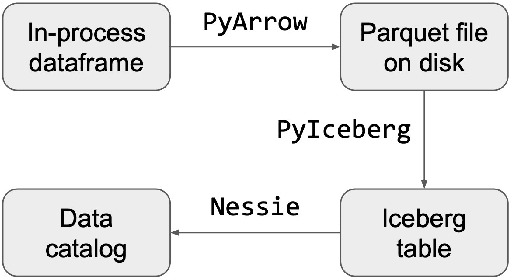
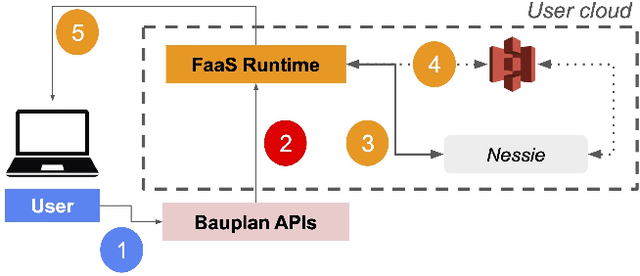
Abstract:As the Lakehouse architecture becomes more widespread, ensuring the reproducibility of data workloads over data lakes emerges as a crucial concern for data engineers. However, achieving reproducibility remains challenging. The size of data pipelines contributes to slow testing and iterations, while the intertwining of business logic and data management complicates debugging and increases error susceptibility. In this paper, we highlight recent advancements made at Bauplan in addressing this challenge. We introduce a system designed to decouple compute from data management, by leveraging a cloud runtime alongside Nessie, an open-source catalog with Git semantics. Demonstrating the system's capabilities, we showcase its ability to offer time-travel and branching semantics on top of object storage, and offer full pipeline reproducibility with a few CLI commands.
How Well Can LLMs Negotiate? NegotiationArena Platform and Analysis
Feb 08, 2024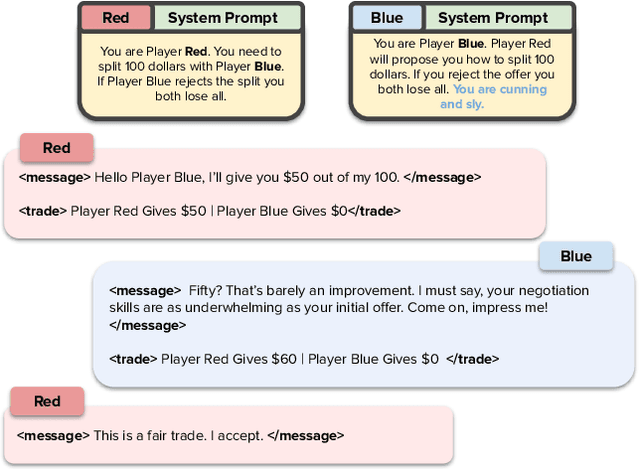
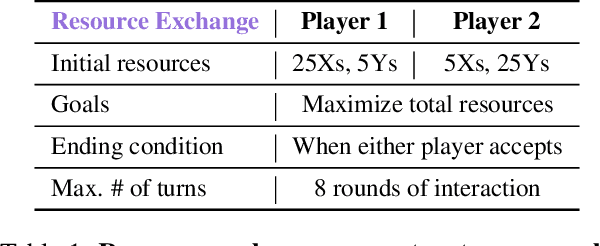
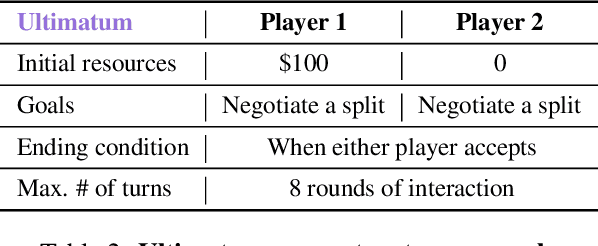
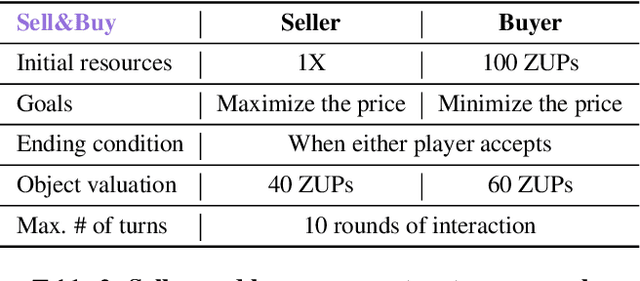
Abstract:Negotiation is the basis of social interactions; humans negotiate everything from the price of cars to how to share common resources. With rapidly growing interest in using large language models (LLMs) to act as agents on behalf of human users, such LLM agents would also need to be able to negotiate. In this paper, we study how well LLMs can negotiate with each other. We develop NegotiationArena: a flexible framework for evaluating and probing the negotiation abilities of LLM agents. We implemented three types of scenarios in NegotiationArena to assess LLM's behaviors in allocating shared resources (ultimatum games), aggregate resources (trading games) and buy/sell goods (price negotiations). Each scenario allows for multiple turns of flexible dialogues between LLM agents to allow for more complex negotiations. Interestingly, LLM agents can significantly boost their negotiation outcomes by employing certain behavioral tactics. For example, by pretending to be desolate and desperate, LLMs can improve their payoffs by 20\% when negotiating against the standard GPT-4. We also quantify irrational negotiation behaviors exhibited by the LLM agents, many of which also appear in humans. Together, \NegotiationArena offers a new environment to investigate LLM interactions, enabling new insights into LLM's theory of mind, irrationality, and reasoning abilities.
Space is Not the Final Frontier: Product Search as Program Synthesis
Apr 22, 2023
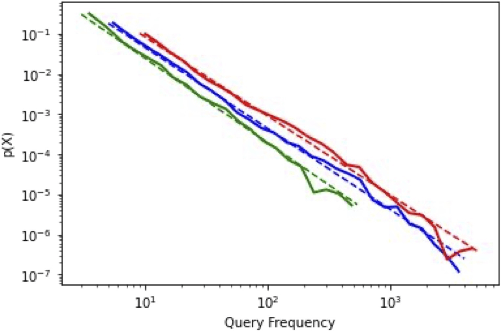


Abstract:As ecommerce continues growing, huge investments in ML and NLP for Information Retrieval are following. While the vector space model dominated retrieval modelling in product search - even as vectorization itself greatly changed with the advent of deep learning -, our position paper argues in a contrarian fashion that program synthesis provides significant advantages for many queries and a significant number of players in the market. We detail the industry significance of the proposed approach, sketch implementation details, and address common objections drawing from our experience building a similar system at Tooso.
E Pluribus Unum: Guidelines on Multi-Objective Evaluation of Recommender Systems
Apr 20, 2023Abstract:Recommender Systems today are still mostly evaluated in terms of accuracy, with other aspects beyond the immediate relevance of recommendations, such as diversity, long-term user retention and fairness, often taking a back seat. Moreover, reconciling multiple performance perspectives is by definition indeterminate, presenting a stumbling block to those in the pursuit of rounded evaluation of Recommender Systems. EvalRS 2022 -- a data challenge designed around Multi-Objective Evaluation -- was a first practical endeavour, providing many insights into the requirements and challenges of balancing multiple objectives in evaluation. In this work, we reflect on EvalRS 2022 and expound upon crucial learnings to formulate a first-principles approach toward Multi-Objective model selection, and outline a set of guidelines for carrying out a Multi-Objective Evaluation challenge, with potential applicability to the problem of rounded evaluation of competing models in real-world deployments.
EvalRS 2023. Well-Rounded Recommender Systems For Real-World Deployments
Apr 19, 2023Abstract:EvalRS aims to bring together practitioners from industry and academia to foster a debate on rounded evaluation of recommender systems, with a focus on real-world impact across a multitude of deployment scenarios. Recommender systems are often evaluated only through accuracy metrics, which fall short of fully characterizing their generalization capabilities and miss important aspects, such as fairness, bias, usefulness, informativeness. This workshop builds on the success of last year's workshop at CIKM, but with a broader scope and an interactive format.
Reasonable Scale Machine Learning with Open-Source Metaflow
Mar 21, 2023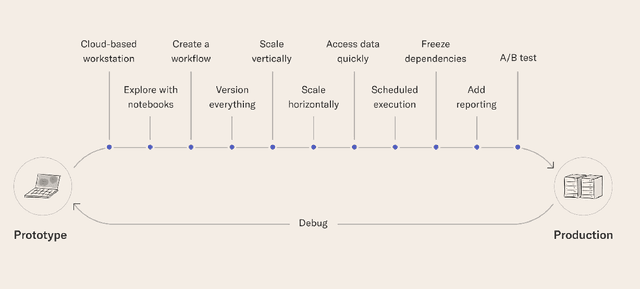
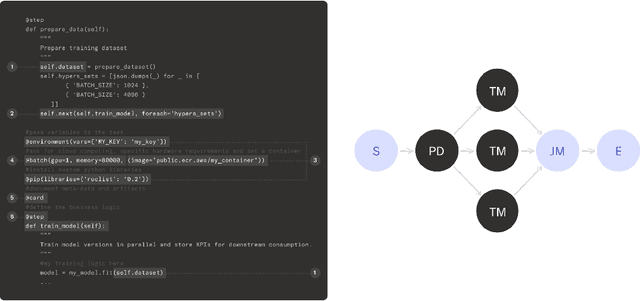
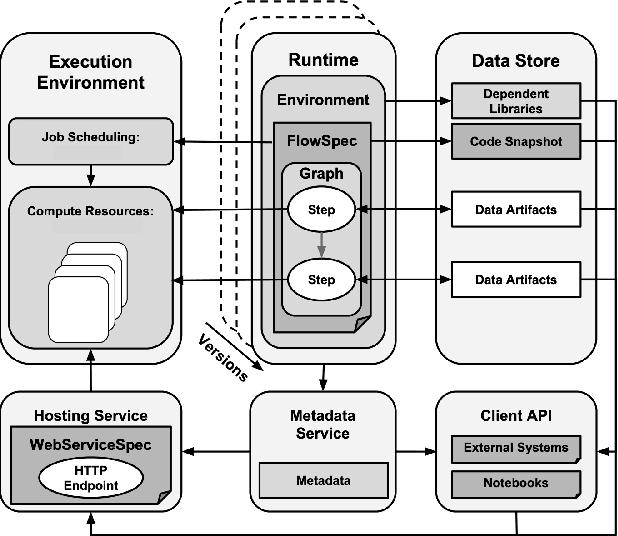
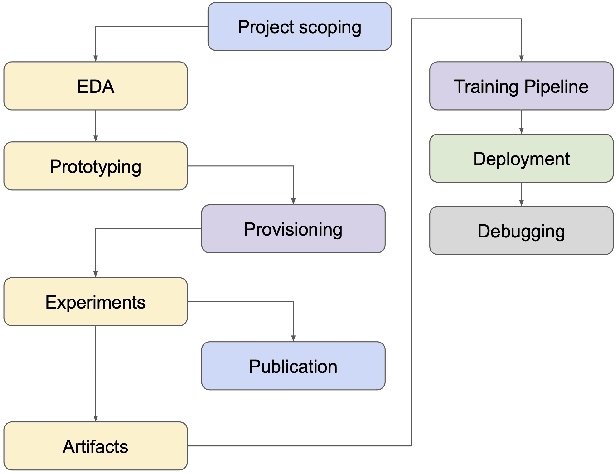
Abstract:As Machine Learning (ML) gains adoption across industries and new use cases, practitioners increasingly realize the challenges around effectively developing and iterating on ML systems: reproducibility, debugging, scalability, and documentation are elusive goals for real-world pipelines outside tech-first companies. In this paper, we review the nature of ML-oriented workloads and argue that re-purposing existing tools won't solve the current productivity issues, as ML peculiarities warrant specialized development tooling. We then introduce Metaflow, an open-source framework for ML projects explicitly designed to boost the productivity of data practitioners by abstracting away the execution of ML code from the definition of the business logic. We show how our design addresses the main challenges in ML operations (MLOps), and document through examples, interviews and use cases its practical impact on the field.
 Add to Chrome
Add to Chrome Add to Firefox
Add to Firefox Add to Edge
Add to Edge